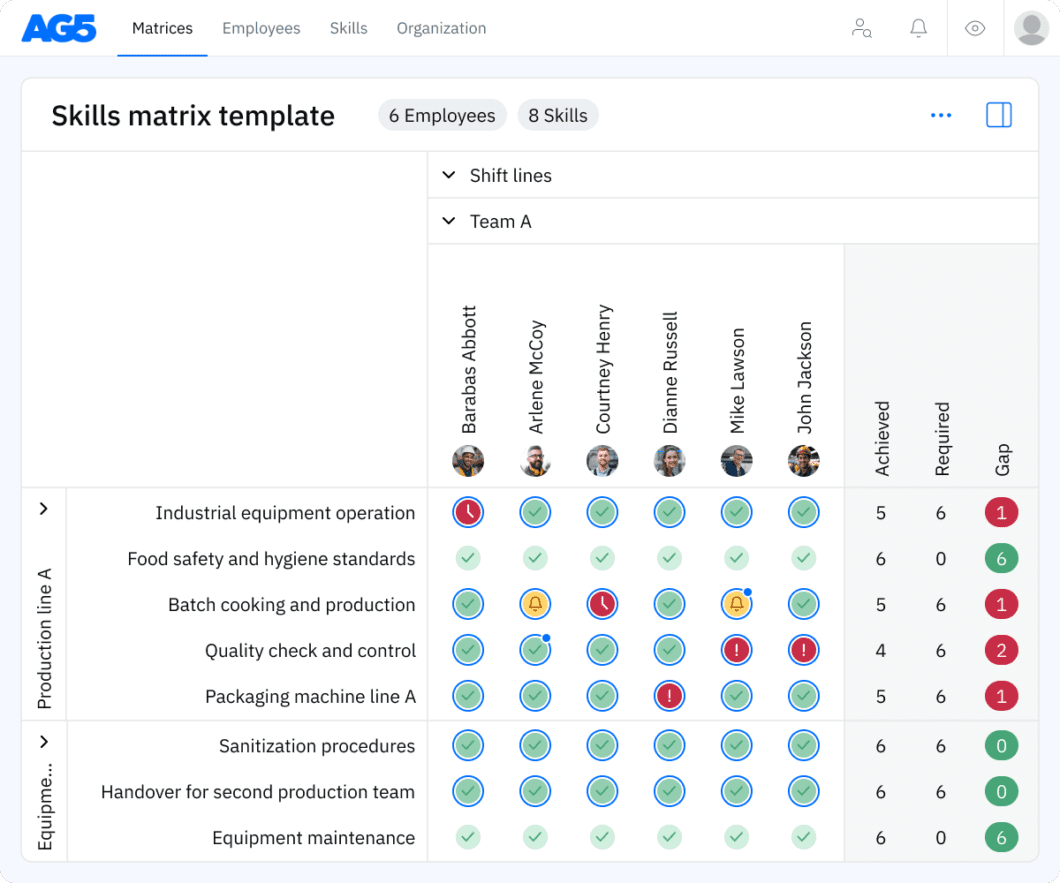Construction skills matrix template
A skills matrix template is a tool that can be used in the construction industry to effectively manage and assess the skills and knowledge of individual employees or teams.
Download your free template here

Overview Copied
With our construction skills training matrix template, you will receive a clear overview of the skills that are present in your organization, as well as those that are missing. Using this information, you can develop and implement a plan to ensure that your employees’ skills are up to date, comprehensive, compliant, and ready for the future.
Project management and leadership
- Certified Construction Manager (CCM)
- Certified associate constructor (CAC)
- Certified professional constructor (CPC)
- Design-build professional (DBIA)
- Blueprint reading and interpretation
- Concrete forming and finishing
Technical and specialized skills
- Certified welding inspector (CWI)
- Building Performance Institute (BPI) Building Analyst Certification
- Construction Document Technologist (CDT)
- Certified Cost Professional (CCP)
- Construction Specifications Institute (CSI) Certification
- Welding techniques and inspection
- Building performance analysis
- Construction document interpretation
- Cost estimation and analysis
- Specification writing and review
Safety and health
- OSHA 30-Hour Construction Safety Certification
- Construction Health and Safety Technician (CHST)
- Certified Safety Professional (CSP)
- Hazard identification and mitigation
- Emergency response planning
- Construction site inspections
- Health and safety program development
- Incident investigation and reporting
Sustainability and environmental
- LEED Green Associate (LEED GA)
- Sustainable building practices
- Green building materials and technologies
- Energy efficiency analysis
- Environmental impact assessment in construction
Benefits Copied
Using a skills matrix template can benefit your quality control teams in various ways. Among them:
- Specialized expertise. Your quality control teams can use this skills matrix to identify and develop expertise in crucial areas such as precision measurement techniques, material inspection, and adherence to industry-specific standards like ISO 9001.
- Efficient quality assurance. Your quality control teams can use this skills matrix to ensure that their members’ skills align with the unique demands of production lines, such as in-process inspections, defect identification, and compliance with quality or regulatory standards.
- Enhanced continuous improvement. By using this skills matrix to easily and quickly identify skills gaps, your QC teams can address issues swiftly, fostering a culture of continuous improvement.
If you’re ready to take the next step towards taking control of construction skills management in your organization, visit the construction industry section of our website.
Learn about skills management for the construction industry
Download the free Excel Construction skills matrix template Copied
We also have a free Excel template available that you can download if you are not ready to get started with AG5. To download it, please complete this form here.
Customizing a skills matrix Copied
The scope of a skills matrix can be as large or small as you choose. For example, it could cover your entire construction organization – or only those certified to operate industrial machinery and equipment.
To customize a skills matrix to your needs, you should:
- Define focus. Clarify if the skills matrix pertains to an entire department or specific roles within it.
- Identify key skills. List essential competencies for each role or area of operation.
- Establish proficiency levels. Define skill proficiency levels, aligning them with job requirements.
- Set evaluation criteria. Create a clear evaluation process, considering on-the-job performance and training qualifications.
- Regularly review and update. Ensure regular reviews to adapt to evolving roles, technologies, and organizational goals.
Looking for alternatives to Excel for your skills matrix templates? Copied
AG5’s skills management software enables you to visualize and close skills gaps across your organization and construction teams – no need for complicated Excel spreadsheets. You’ll use intuitive skills matrices that bring together skills data and job requirements – and are always up to date.
FAQ Copied
-
What are the benefits of using a construction skills matrix?
-
Is this construction skills matrix free to download?
-
How do I use a construction skills matrix?
-
What if I want to take my skills management to the next level?
Author Copied
Revisions Copied
Tired of managing skills in Excel?
Say goodbye to Excel matrices. Start using AG5’s plug and play skill matrix software.
Recognized by G2 for Excellence in Skills Management

